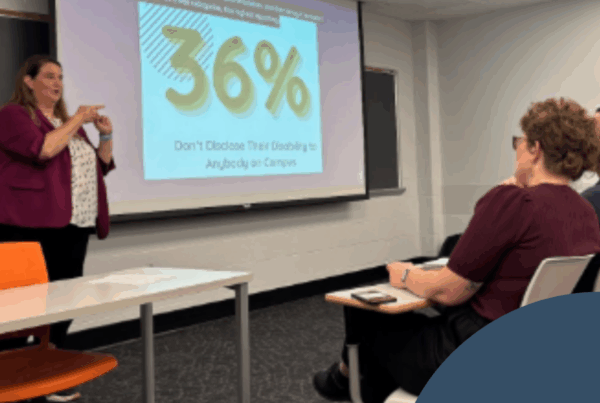Summary
Including people with disabilities in research is crucial. Dr. Stephanie Cawthon will delve into the importance of lived experience in research.
Center Mission is Topic of Research Webinar with Executive Director Stephanie Cawthon
Including people with lived experience in research is a foundational component of the National Disability Center, which has a Leadership Team, Student Fellows, and Faculty Cadre composed of people with disabilities or people deeply connected with the disability community.
That’s why when the federal Interagency Committee on Disability Research (ICDR) invited Dr. Stephanie Cawthon, the National Disability Center’s Executive Director and Principal Investigator, to participate as a panelist for their national webinar, Including People with Lived Experience on Research Teams, she quickly agreed.
About the Topic of Lived Experience
“Including people with lived experience is an essential part of my own research and work as a professor, research center leader, and international journal editor,” said Dr. Cawthon. “At the National Disability Center, our lived experiences as disabled people help us achieve an authentic, holistic approach that is critical to our mission to create the first actionable research foundation for disabled student success in postsecondary settings.”
It can also contribute to culturally relevant research evidence.
“For far too long, educational research with disabled participants has been considered neutral, when in reality, it reflects the values and biases of the researchers and the participants. Culturally relevant evidence demands that the entire research process — from design to recruitment to interpretation of findings to how results are shared — is built with and by people who are the focus of research,” said Dr. Cawthon. “That’s part of our mission at the National Disability Center.”
About the Webinar
“Including People with Lived Experience on Research Teams” will be held on Tuesday, April 30, from 12:00 p.m. to 1:00 p.m. (Eastern Time) via Zoom.
After a welcome from ICDR’s Executive Director, Dr. Rasheda Parks, the panel discussion will be followed by a 15-minute Q&A and discussion session. Joining Dr. Cawthon on the panel are:
- Timotheus “T.J.” Gordon, Jr., Visiting Research Associate II at the Institute on Disability and Human Development and Co-Founder of Chicagoland Disabled People of Color Coalition
- James Sulzer, PhD, Staff Scientist in The MetroHealth System and Associate Professor in the Department of Physical Medicine and Rehabilitation at Case Western Reserve University
- Bonnielin Swenor, PhD, MPH, Director of Johns Hopkins Disability Health Research Center
The webinar moderator is Susan Daniels, PhD, who is National Autism Coordinator for the Department of Health and Human Services, Director of the Office of National Autism Coordination at the National Institute of Mental Health, and Executive Secretary of the Interagency Autism Coordinating Committee.
Register here. Real-time captioning and American Sign Language interpreting will be provided, plus attendees can request additional accommodations.
About ICDR
Authorized by the 1973 Rehabilitation Act, as amended, the Interagency Committee on Disability Research (ICDR) was established to promote coordination and collaboration among federal departments and agencies conducting disability, independent living, and rehabilitation research programs—including programs related to assistive technology research, and research that incorporates the principles of universal design.
ICDR is charged with sharing information about research being carried out by committee members and other federal departments and organizations, identifying and making efforts to address areas of research that are not being adequately addressed, identifying and establishing clear research priorities, and promoting interagency collaboration and joint research activities that reduce unnecessary duplication of effort.


